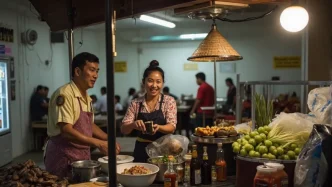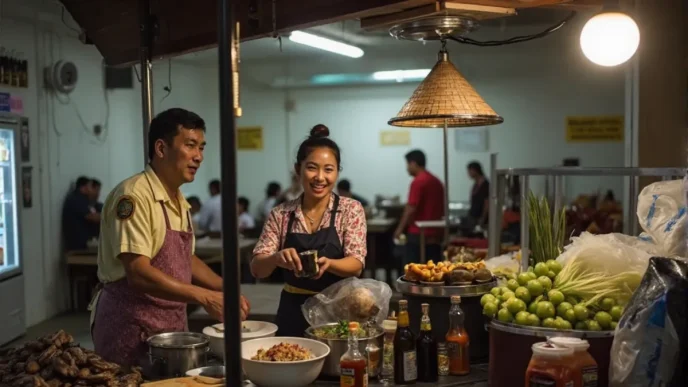A chilling discovery at a logistics shop in Sa Kaeo province has sent shockwaves through Thailand, as authorities uncovered two dried infant bodies concealed in a parcel intended for a recipient in Chiang Mai. The incident, reported on Thursday afternoon, has raised serious questions about the illegal trade of human remains and the shadowy practices of self-proclaimed mediums in the region. Staff at a private logistics service in Tambon Ban Mai Nongsai, located in Sa Kaeo’s Aranyaprathet district, alerted police at around 1 pm after growing suspicious of a package brought in for mailing. Upon inspection, they were horrified to find two blackened, dried infant corpses inside. The parcel was addressed to an individual in Chiang Mai, a northern city over 700 kilometres away, hinting at a potentially far-reaching network involved in the trade. Sa Kaeo Deputy Police Chief Pol Col Jaturaphat Singhatsathit arrived at the scene to investigate. According to initial findings, a 47-year-old man named Chai admitted to delivering the package on behalf of its owner, a 39-year-old self-described black magician and medium known as Pol. Chai claimed he was merely hired to transport the parcel to the logistics shop, unaware of its grim contents.
A Medium’s Dark Trade
Police traced the package back to Pol’s shop in Tambon Pa Rai, also in Aranyaprathet district. During their investigation, authorities learned that Pol had purchased the infant bodies from a source in Samut Prakan, a province near Bangkok, for 10,000 baht (approximately £220). Pol, who has operated his shop for three years and claims to communicate with spirits, revealed that the bodies were intended for sale to a group of Chinese tourists.
According to Pol’s statement to the police, a Thai woman accompanied four Chinese tourists to his shop in December last year. The group returned on 22 January, at which point they expressed interest in purchasing the infant remains for 30,000 baht (approximately £660). Pol agreed to mail the bodies to a Chiang Mai address at a later date, as per their instructions. The significant markup in price suggests a lucrative, albeit macabre, trade in human remains, potentially linked to superstitious or ritualistic practices.
While the exact motives of the buyers remain unclear, the use of infant remains in certain black magic rituals is not unheard of in parts of South East Asia. Such practices, often shrouded in secrecy, are believed by some to confer spiritual power or protection, though they are widely condemned and illegal under Thai law.
Legal and Ethical Concerns
Thai authorities are now grappling with the legal implications of the case. Pol Col Jaturaphat noted that police are still deliberating over the specific charges to be filed against Pol and any other individuals involved. Under Thai law, the trade and possession of human remains without proper authorisation is strictly prohibited, and violations can result in severe penalties. Additionally, if the infants’ deaths are found to be suspicious or linked to foul play, further charges related to murder or desecration of a corpse could be pursued.
Beyond the legal ramifications, the incident has sparked outrage and concern among local communities. The discovery of infant remains in a seemingly routine parcel raises unsettling questions about how such items could be transported undetected and whether this case is an isolated incident or part of a broader network. Public sentiment, as reflected in early reactions on social media platforms, has called for stricter oversight of logistics services and harsher punishments for those involved in such trades.
Cultural and Social Context
In Thailand, beliefs in the supernatural remain deeply ingrained in some segments of society, often intersecting with Buddhist and animist traditions. Mediums and spiritual practitioners like Pol cater to individuals seeking guidance, protection, or solutions to personal problems through rituals that may involve amulets, charms, or, in extreme cases, human remains. While many of these practices are harmless cultural expressions, the exploitation of human remains crosses ethical and legal boundaries, prompting calls for greater regulation of such activities.
The involvement of foreign nationals in this case also adds a layer of complexity. Chiang Mai, the intended destination of the parcel, is a hub for tourism and has a significant expatriate community. If the recipients in Chiang Mai are linked to the Chinese tourists mentioned by Pol, it could point to an international dimension to the trade, raising concerns about cross-border trafficking of human remains.
Broader Implications
This disturbing incident is not the first of its kind in Thailand. In 2012, a high-profile case involving a British citizen and the trafficking of foetal remains for black magic rituals made international headlines, exposing the dark underbelly of such practices. That case led to a crackdown on the trade, but the Sa Kaeo discovery suggests that these activities persist in the shadows, exploiting legal loopholes and societal taboos.
Authorities now face the challenge of not only prosecuting those directly involved but also addressing the systemic issues that allow such trades to continue. Enhanced monitoring of logistics services, public awareness campaigns, and stricter licensing for spiritual practitioners could help curb these practices. However, without addressing the cultural and economic factors driving demand for such items, long-term solutions remain elusive.
As the investigation unfolds, police are expected to trace the origins of the infant bodies, determine the circumstances of their deaths, and identify all parties involved in the transaction. The case serves as a grim reminder of the vulnerabilities within systems meant to protect the most defenceless and the urgent need for vigilance against exploitation in its most horrific forms.














